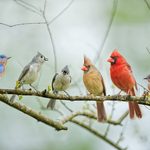How Does Your Garden Grow?
Enlighten yourself to the art of “mindful” gardening. DeAnna Radaj, casaGURU’s home green guru, warns homeowners of the dangers of pesticides and how to avoid harming your garden.

Did you know that homeowners apply up to 10 times more chemicals per acre than farmers do? According to the EPA, Americans spend $25 billion per year on lawn care. Residential lawns and gardens are doused with 80 million pounds of chemical pesticides and 70 million tons of fertilizers annually. A portion of these chemicals run off into local streams and watersheds. Watering lawns accounts for an incredible 40 to 60% of residential water consumption during the summer months. This overwatering represents a misuse of fresh water, a resource already scarce in some parts of the country!
Dangers of Pesticide Use
Pesticides were created from Agent Orange, and they were created to cause nerve damage on all who were exposed to it. Pesticides were created to kill the things they come in contact with, and unfortunately this can include pets, wildlife, and flowers. Quick Quiz: Do you think pesticides are good energy additions to your yard and garden? (If you answered NO, give yourself a DeAnna gold star.)
- Common lawn pesticides and fertilizers have been linked to various types of cancer, neurological damage and Parkinson’s disease.
- They’re also the leading cause of accidental pet poisoning.
- Once this has been applied to your yard, it will be tracked into your home where it will settle into carpets and the cracks in your floors. At a previous house, where everyone had what I call “Stepford Yards,” those perfect every-blade-in-place grass extravaganzas, my dog Libby couldn’t be walked for a few days after the ChemLawn people sprayed all of my neighbors’ yards. The fumes were too much for her and she literally couldn’t breathe.
Feng Shui Tips for your Garden and Landscape
- Set the blade height of your mower to 2.5 to 3 inches, mow regularly, and don’t rake up the clippings; let them decompose in place and return their nutrients back into the soil. Mow when your grass is dry and keep mower blades sharp and clean.
- If you need additional fertilizer, rake in a quarter to a half an inch layer of compost each spring and fall. You can use corn gluten as a weed preventer as well.
- Do you maintain more lawn than you need and/or use? Why not replace part of your lawn with native perennials or a water feature? Native plants, once established, require only minimal attention and that means less watering, less chemicals, and a lot less pampering.
- Cut down on excessive watering by watering less frequently but more deeply; deeper watering helps the roots to grow deeper.
- Properly placed trees and shrubs can save on heating and cooling costs. Plant them on the West or Southwest side of your house. Plant shrubs close to the house to help insulate your home. Layers of plants of medium-to-tall size will help eliminate street noise.
- Plantings in your yard will help to slow water and wind movement, decrease soil erosion (think of the flooding that occurs after a bad wildfire season or after massive logging), reduce runoff, and replenish groundwater reserves.
- Roughly a third of all waste dumped in landfills in the U.S. consists of garden clippings and kitchen waste! How about composting these items to decrease your waste to nearly zero — plus you will have nutrient-rich fertilizer to use in your garden!
- Less than 2% of insects are harmful; most are beneficial and help pollinate your plants. Beneficial insects include: beetles, ladybugs, fireflies, green lacewings, praying mantis, spiders, and wasps. Prune and remove diseased leaves, branches, or whole plants to stop the spread of disease.
- Herbal pest repellants include garlic and hot-pepper sprays, as well as a few drops of soap, which is toxic to soft-bodied insects.
When employing Feng Shui and other Integrative Lifestyle Design tips to your outdoor space you create a space that, as garden designer Pamela Woods states, is “sought after as a means of retaining our sanity and connection with our spiritual nature.”
DeAnna Radaj, owner of Bante Design LLC and its production division Eden Place Productions, is a designer who specializes in Integrative Lifestyle Design (the fusion of Eastern and Western interior design philosophies incorporating feng shui and healthy home principles).

For great articles, tips, inspiration and more, visit www.casaGURU.com-The smartest way to find licensed and insured house experts-from home stagers to contractors to home Inspectors and realtors.
Get more home and gardening tips when you sign up for our weekly newsletters.



